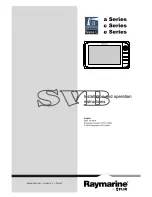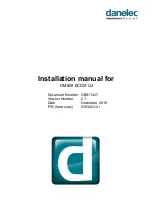
M A G U I R E P R O D U C T S , I N C .
101
W E I G H S C A L E B L E N D E R
Mix Problems
Customers with mix problems have several options available.
Decrease the batch size by lowering the FUL parameter value. This does two things. First, it causes the components to be
dispensed in smaller, more frequent batches, which places more and smaller layers of material into the mix chamber. Second, it
lowers the level of material in the mix chamber immediately after a dispense. It is critical to proper mixing that the mix blades reach
up through the top of the material in the mix chamber during mix time. Dispensing a large batch may bury these blades, particularly
when the process is not running at full blender capacity. A smaller batch size, while reducing throughput rate, will help prevent the
mix blades being covered during mix time.
Be sure level sensor is mounted in its lowest position, and increase sensitivity as much as possible. Both serve to keep a batch
from being dispensed so early as to cover the mix blades.
On units without flow control valves (FCA), increase the DLY parameter to as number as high as 50 percent of the time between
cycles. DLY is the time delay (in interrupts) from the sensor being uncovered until we begin the batch. Increasing DLY allows the
mix chamber to empty somewhat before the next batch drops. The maximum possible value for DLY is 29999 or 122 seconds.
You may increase the mix time at the end of each batch by changing the last two digits of the MIX parameter. If throughput is very
high it may be better to run the mixer continuously. However, added mix time sometimes causes separation after an initial mixing.
Different bulk densities and static electricity both aggravate this potential for separation from excessive mixing.
If a blender is mounted on a stand over a surge hopper, there should be a FCA, automatic flow control valve, fitted to the bottom of
the blender. This valve must be plumbed so that it is closed when the level sensor is uncovered. When the sensor is covered the
valve opens to release material. The purpose of this valve is to ensure mixing. The FCV parameter delays the opening of this
valve for 6 seconds. You can increase this delay time if you feel additional mixing is required before release.
On model WSB-940, be sure the weigh bin has two baffles installed. These ensure horizontal layering (as opposed to side by side
layering) of materials prior to dropping into the mix chamber.
Bulk density and pellet shape differences, specifically smooth virgin pellets mixed with square higher density color pellets, can
separate when dropped onto a sloping pile, as exists in a hopper, Gaylord, or surge bin. The light round pellets flow like water to
the edges, while the heavier square color pellets stay put. This is difficult to correct. It is best not to drop these kinds of blends into
large containers.
Vacuum conveying can also separate materials of different bulk densities. Maintain high air velocity to minimize this.
Models WSB-MB, 100 series, and some 200 series units use an air drive for the mix blade, instead of an electric motor. Air drives
have these advantages:
Improved mixing due to back and forth motion of the blades.
No EMF (Electro Magnetic Force) feedback to the processor from electrical demands of the motor resulting, the results in less
processor problems.
Less electronic parts on the board, parts that are vulnerable to failure from in-plant voltage spikes, from storms and power failures,
parts that can represent a percentage of failures over the lifetime of the blender.
Inherent safety for plant personnel due to the more controlled, more limited torque of an air drive compared to an electric motor
drive. A correctly sized electric motor can deliver 10 times the normal design and operating torque when stalled. In spite of
interlocks, this presents a potential safety hazard.
If you are having mix problems with air drives, be sure the blades moves a full 270 degrees (3/4 turn) with each sweep. If they do
not, try the following:
Increase the air pressure. If the gauge pressure drops more then 5 pounds during operation of the blades, the air supply line is too
small.
Lower the pile in the mix chamber to reduce torque requirements on the mix blade. This is explained above.
Increase the MPO parameter from 122 (1/2 second) to 183 (3/4 second) or 244 (1 full second). This allows more time for a full mix
blade sweep to occur. You may also want to increase mix time from 10 seconds to 15 or 20 seconds so that, in spite of slower mix
blade speed, the same amount of mixing occurs.
Summary of Contents for Weigh Scale Blender
Page 17: ...M A G U I R E P R O D U C T S I N C 17 W E I G H S C A L E B L E N D E R...
Page 116: ...M A G U I R E P R O D U C T S I N C 116 W E I G H S C A L E B L E N D E R Technical Drawings...
Page 117: ...M A G U I R E P R O D U C T S I N C 117 W E I G H S C A L E B L E N D E R...
Page 118: ...M A G U I R E P R O D U C T S I N C 118 W E I G H S C A L E B L E N D E R...
Page 119: ...M A G U I R E P R O D U C T S I N C 119 W E I G H S C A L E B L E N D E R...
Page 120: ...M A G U I R E P R O D U C T S I N C 120 W E I G H S C A L E B L E N D E R...
Page 121: ...M A G U I R E P R O D U C T S I N C 121 W E I G H S C A L E B L E N D E R...
Page 122: ...M A G U I R E P R O D U C T S I N C 122 W E I G H S C A L E B L E N D E R...
Page 123: ...M A G U I R E P R O D U C T S I N C 123 W E I G H S C A L E B L E N D E R...
Page 124: ...M A G U I R E P R O D U C T S I N C 124 W E I G H S C A L E B L E N D E R...
Page 125: ...M A G U I R E P R O D U C T S I N C 125 W E I G H S C A L E B L E N D E R...
Page 126: ...M A G U I R E P R O D U C T S I N C 126 W E I G H S C A L E B L E N D E R...
Page 127: ...M A G U I R E P R O D U C T S I N C 127 W E I G H S C A L E B L E N D E R...
Page 136: ...M A G U I R E P R O D U C T S I N C 136 W E I G H S C A L E B L E N D E R...
















































